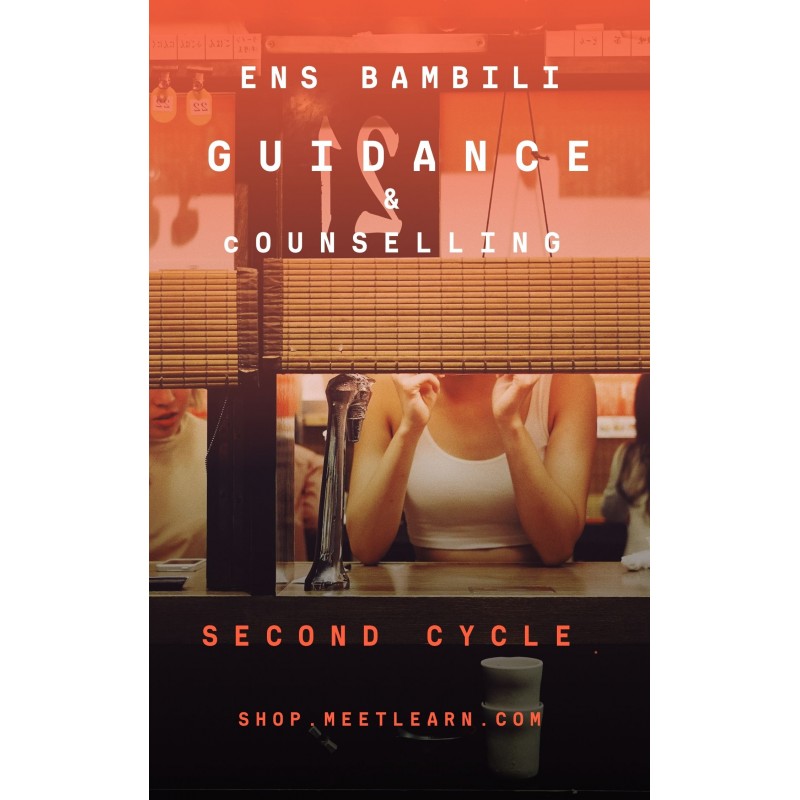



Number of Pages: 36
Note: This Book is a PDF File and so is available online only. Once your Payment is made, you will receive an automatic download link into your email address.
 Security policy (edit with Customer reassurance module)
Security policy (edit with Customer reassurance module)
 Delivery policy (edit with Customer reassurance module)
Delivery policy (edit with Customer reassurance module)
 Return policy (edit with Customer reassurance module)
Return policy (edit with Customer reassurance module)
Note: This Book is a PDF File and so is available online only. Once your Payment is made, you will receive an automatic download link into your email address.
Details [Content]:
Guidance & Counselling 2014
Extract of the Paper of 2017/2018
COMPETITIVE ENTRANCE EXAMINATION INTO THE FIRST YEAR OF THE SECOND CYCLE FOR 2017/2018 DEPARTMENT: GUIDANCE AND COUNSELLING
DURATION: 4 HOURS
INSTRUCTIONS: Answer all questions! Select the correct answer to each of the questions in Section One, Two and Three and write the corresponding letter (A, B, C or D) in the Answer Booklet provided. Section Four. comprises two structured essay.
Make sure that you insert the question paper inside the Answer Booklet before you leave the examination hall!
SECTION ONE (40%)
1. Cooperative and collaborative learning are associated to_________
A) Jerome Brunner' B) Albert Bandura C) Lev Vygotsky D) BF Skinner
2. At which stage of development do individuals suffer from identity versus role confusion
A) Childhood B) late childhood C) adolescence D) puberty
3. When should a teacher and a pupil hold a case conference?
A) As need arises; B) Before the start of the school year
C) At the end of the semester D) At the close of the day's work
4. Kristina is already in the senior year of high school. After attending to their symposium or career choices, still Kristina is confused with her career plan, whether to take Teaching or Physical Therapy. How would you assist her?
A) Tell her to choose a course that is closer to her heart. C) Tell her that you are a model in Teaching
B) Tell her to take an aptitude test to know about her strengths. D) Let her see a career guidance counselor
5. Ms. Burgos found that one of her pupils has a language disorder. What must she do?
A) Laugh at her when she makes mistakes. B) Encourage her to join other pupils with the same difficulty.
C) Force her to talk. D) Listen to her attentively and create a group activity where she can participate.
6. One of the reasons for studying psychology is -
A) to understand the human mind and how it works. C) to completely understand and predict human behaviour
B) .to have the answers to all of life's questions D) to learn how to read and interpret the human mind.
7. What is the positive measure to take when an advanced learner in your class starts to cause some discipline problems?
A) Let him go to the library to read. B) Give him other activities that are very difficult for him to do
C) Better challenge him to do something that will attract his attention.
C) Tell him that you don't like misbehaving students even if they are bright in class.
8. How can you help your student who seems to be timid and withdrawn because of his physical defect or abnormality?
A) Treat him like other normal students and let him join friendly and accepting classmates.
B) Advise his parents to give him a companion always. C) Let him go to the doctor for some advice. D) Provide him a wheelchair so that he can join the group
9. What should you do to a child who is intelligent but an underachiever?
A) Discover his talents B) Develop his interests C) Provide challenging activities
D) Ignore his abilities
10. The teacher conferred with the parents of Joseph regarding his academic performance in the school. This move of the teacher is recommendable because___________.
A) There is an open communication between the teacher and the parents. B) The principal asked for the parents' of Joseph C) There is no more time to improve the grade of Joseph. D) The teacher does not want to fail Joseph. '
11. According to John Watson, introspection was:
A) a valid method of research. B) unscientific. C) the study of the mind in use. C.) pre-scientific thinking.
12. Which assumption must be AVOIDED in order to become successful in counseling?
A) The counselor must be able to relate lo the student, B) The environment must provide assurance of confidentiality C) The counselor (ells the student what to do. D) The student is willing to participate in the process.
13. Research shows that a counselor can be most effective when providing services for a client who is a member of a minority group if the counselor
A) is both knowledgeable and responsive to cultural differences B) is a member of the client's minority group C) has lived with the client minority group for a long time
D) has had cross-cultural training.
14. Which of the following is NOT an ethical issue for beginning counselors?
A) using appropriate attending behaviours during sessions B) Confidentiality
C) focusing on the needs of the client during sessions D) avoiding dual relationships
15. A teacher tells a student, "I do not hate you but am not happy with what you did to your friend. Which counselling technique is the teacher using? A) empathy B) genuineness C) unconditional position D) Consent
Order the complete booklet to continue...